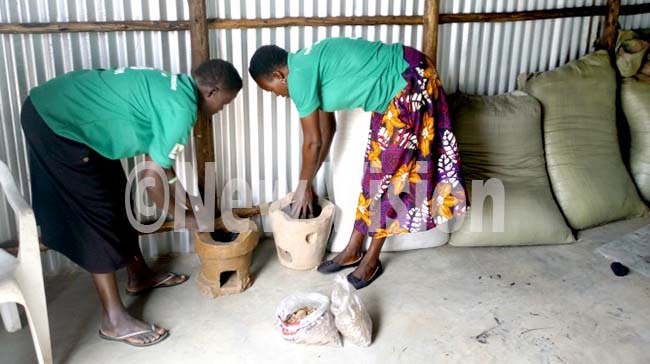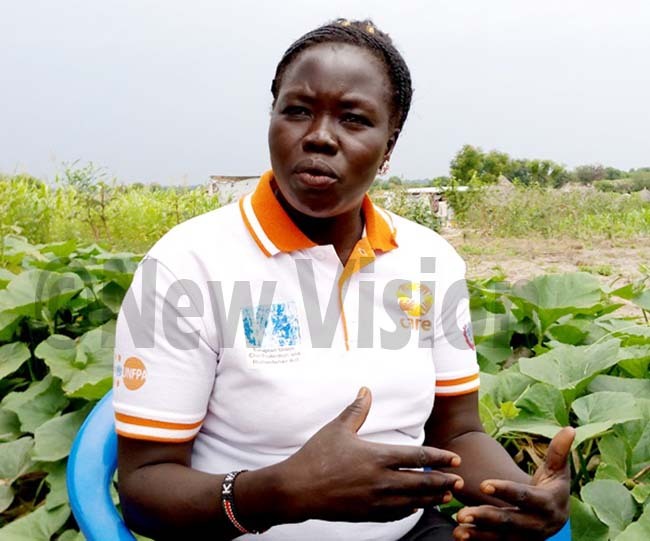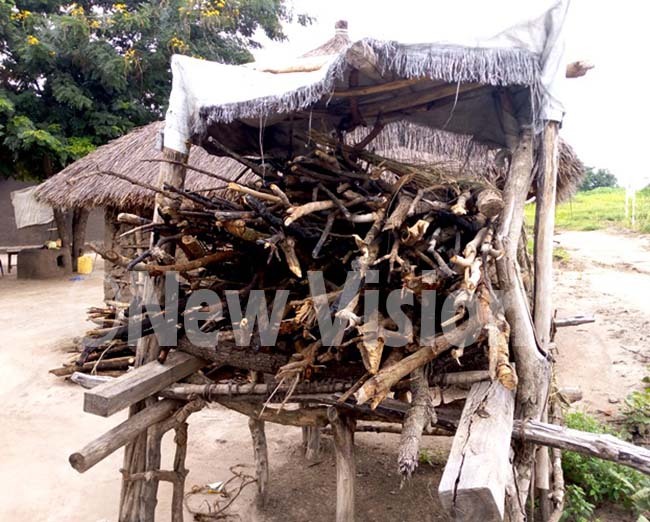Refugees using human waste as fuel
Nov 08, 2019
Briquettes made out of human waste take up to 8hours to burn out making it easy to cook compared to firewood,” narrates Roda Selwa, a youth, and member of Loketa Women.

ARUA - A group of South Sudanese Refugee women in Arua district is manufacturing briquettes out of human waste to serve as an alternative for wood fuel and charcoal.
Briquettes made out of human waste take up to 8hours to burn out making it easy to cook compared to firewood," narrates Roda Selwa, a youth, and member of Loketa Women.
Loketa women group is one of the five groups in the settlements of Rhino-Camp, Imvepi, Omugo, and Bidibidi camp that benefited from skills training in making charcoal briquettes from Oxfam.
 Ajonye showing how Charcoal Briquettes work in locally made energy-saving stoves. Photo by Robert Ariaka
Ajonye showing how Charcoal Briquettes work in locally made energy-saving stoves. Photo by Robert AriakaThe initial training focused on making charcoal briquettes out of solid waste generated from crop residues. However, the women adopted new skills of turning human waste into charcoal briquettes after attaining training in Nakuru Kenya.
Tabu Regina, the secretary Loketa women group in Ariwa village in Rhino Camp settlement said, the group got support from Oxfam to make briquettes using crop residues and human waste.
The briquettes are made out of sorghum stalk, Simsim stalk, beans stems, and banana leaves. "We carbonize the residues, once it turns black; it is crashed with machines and mixed with porridge made out of cassava flour to form briquettes," Regina said.
Rashid Mawejje, the public health promoter working with Oxfam said they spent Sh373.3m in training, procuring the equipment and providing the necessary support for the refugee women.
Mawejje said Oxfam supports five groups in the initiative of charcoal briquettes. "Recycling solid waste from crop residues was the starting point, but now the women have ventured into processing human waste to charcoal briquettes," Mawejje said.
Regina is optimistic, once expanded; briquette making environmentally helps reduce on too much tree cutting.
 Tabu Regina, the secretary Loketa women group in Ariwa village in Rhino Camp explains how they make briquettes using crop residues and human waste. Photo by Robert Ariaka
Tabu Regina, the secretary Loketa women group in Ariwa village in Rhino Camp explains how they make briquettes using crop residues and human waste. Photo by Robert AriakaShe urges the Government to support groups that are ready to make briquettes and partner with implementing partners in the refugee settlements to increase on training more youth and women groups to combat climate change.
The youthful, adults and elderly women in the groups use their hands to feel the mixed component for compaction. Once it is ready, the women compact it to form charcoal briquettes at different sizes from the smallest to the biggest.
Besides the solid waste briquettes, the group has now ventured into making charcoal briquettes using treated fecal slag. Oxfam supplies the treated fecal matter from Lira.
The members appeal to Oxfam to construct a processing plant for human waste in the refugee settlement to ease access to the human slag for consistent supply.
A store has also been constructed by Oxfam for the women to keep the charcoal briquettes as the source for the market.
She confirmed that the women started making the briquettes in 2018. During the period, the women have improved their economic status and save some money in the group SACCO.
The group takes advantage of visitors to market the products in the settlements alongside the potential market during food distribution time where refugees after getting money buy briquettes.
"Right now, we do not go to the bush to collect firewood because of risks associated with collecting firewood. Some women are raped in the bush while looking" Regina said.
Regina said charcoal briquettes preserve the environment a reason they keep educating the community to use briquettes and stop cutting trees.
She appeals to partners working in the refugee settlement to extend the support of distributing tree seedlings to the refugees to plant trees and restore the environment.
According to Regina, charcoal briquettes are cheaper, burn longer and accumulate enough heat to cook. It also keeps the saucepan clean while cooking.
She said the process of cutting trees to make charcoal is tiresome. "We have seen people who make charcoal suffer but making briquettes is easy with less effort" Regina explained.
She said, making charcoal briquettes provide jobs for women and youth in the refugee settlements. Loketa women group has 40 members who are self-employed through briquettes making.
The women make more than 300 briquettes in a day and market the products within the settlements and other parts of the West Nile region.
Savings in VSLA
Regina says profits realized from the briquettes helps group members manage their home needs, pay school fees for children and save the balance in the Village Savings and Loans Association (VSLA).
The group hires land to cultivate Simsim and use the proceeds for expanding on their savings and crop residues for making more briquettes. The members are able to borrow money from the savings and pay with interest to boost the savings.
Some members have ventured into businesses after borrowing money from the group. The savings group has improved the lives of single mothers, disabled, widows and those married.
"We support each other as a group both financially and psychosocial a reason we need more financial boost from organizations to increase the group savings and borrowing capacity" Regina requested.
Regina says, when all the group members want to borrow money, the money is not enough a reason she thinks the government and implementing partners should be able to support and boost the Savings group with more funding.
Currently, Regina is managing a salon in Ariwa which she started after borrowing 300,000 from the savings group.
Regina also works as a hygiene promoter in her village takes care of 9 people. Other activities the groups undertake include knitting, bakery, and making beads.
The products are sold to staff of NGOs working in the refugee settlements.
Mary Ajonye, the chairperson of the group said they sale the briquettes from Sh1,000 to 3,000.
Neima Gaba a refugee mother of one child said before the introduction of charcoal briquettes, she would rely on firewood and charcoal made out of wood.
"When Oxfam introduced briquette making machines, I abandoned firewood, I now use charcoal Briquettes that last longer in cooking than wood," Gaba said.
 Bundles of firewood packed at home in Ariwa Village in Rhino Camp Refugee Settlement. Photo by Robert Ariaka
Bundles of firewood packed at home in Ariwa Village in Rhino Camp Refugee Settlement. Photo by Robert Ariaka
She says briquettes make women feel relaxed and do other works while they keep cooking food.
Oxfam has secured a place at Yoro base camp to construct a modern processing plant for human waste to help provide materials for the women to make more briquettes.
The plant will be constructed alongside a chess pool emptier to collect fecal matter from different institutions to supply the plant. Transport will also be procured to transport the processed and treated fecal matter to the groups.
Mawejje said there is a tremendous change in the lives of the individual group members who generate income from selling the products to manage their homes.
Making charcoal briquettes reduces massive tree cutting and saves the environment to combat climate change.
Mawejje said issues of climate change are a global matter that comes with changes in rain patterns a reason all stakeholders need to provide attention to environmental protection and provide an alternative energy source.
"If we keep talking about the environment and tree cutting without providing alternative sources of energy, it adds no value," Mawejje said.
Planting trees
Jackson Olema, the program manager for Rural Initiative for Community Empowerment (RICE) West Nile said, in 2018 in an effort to restore destroyed trees and natural cover in refugee settlements RICE planted 317,000 trees in an area of 288.18 hectares.
This has been consolidated with more plantations in 2019 where RICE West Nile planted 1,041,729 trees in an area of 890.75 hectares.
